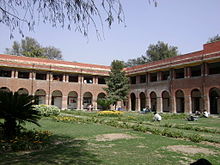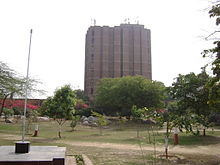Jawaharlal Nehru University
| जवाहरलाल नेहरू विश्वविद्यालय Jawaharlal Nehru University Jawaharlal Nehru University |
|
|---|---|

|
|
| founding | 1966/69 |
| Sponsorship | state |
| place | Delhi |
| country | India |
| Chancellor (Chancellor) | Shri Vijay Kumar Saraswat |
| Students | 8308 (2014/15) |
| Professors | 565 (2014/15) , of which 273 are associate professors and 176 assistant professors |
| Website | www.jnu.ac.in |
The Jawaharlal Nehru University ( JNU , Hindi जवाहरलाल नेहरू विश्वविद्यालय ) is a state university in New Delhi in India . In 2012, the university was named the Best State University in India by the National Assessment and Accreditation Council . It is named after the former Indian Prime Minister Jawaharlal Nehru .
history
The university was founded on December 22nd, 1966 by law of the Indian parliament ( Jawaharlal Nehru University Act ) and opened on November 14th, 1969, the 80th birthday of Nehru by the then President VV Giri . From the beginning, the university was essentially designed as a postgraduate and research university . At the time of foundation, 10 faculties ( schools ) were planned, some of which did not start operating until the following years (1971 School of International Studies , School of Language, Literature and Culture Studies , School of Social Sciences , School of Life Sciences ). Others were added later (1974 School of Environmental Sciences , 1975 School of Computer and Systems Sciences , 1986 School of Physical Sciences , 2001 School of Arts and Aesthetics and School of Information Technology , 2006 School of Biotechnology ). Various centers (e.g. Center of African Studies ) are attached to the faculties . In the academic year 2014/15, 8,308 students were enrolled (around half of them women), of which 4,990 were active in research, 2050 were postgraduate courses (e.g. MA , M.Sc. etc.), 1115 were undergraduate courses and 153 completed an undergraduate degree part-time. Of the 8,308 students, 331 (4%) were of foreign origin. As in all government educational institutions in India, a certain percentage of places are reserved for certain population groups. In 2014/15 the numbers for these groups were as follows: Scheduled Castes 1201 = 14.5%, Scheduled Tribes 643 = 7.7%, Other Backward Classes 2434 = 29.3%.
Political orientation
The history and social sciences are dominated by Marxist and subaltern narratives. These are characterized by an inclusive view of history, in which marginalized social strata and minorities such as Muslims, Parsees, Christians or Sikhs belong to the Indian nation as well as the Hindu majority. The JNU professor for Indian early history, Romila Thapar , criticizes the Hindu nationalistic historiography in today's India for the fact that it historically legitimizes the exclusion of minorities. The JNU professor of social history, Indivar Kamtekar , is a supporter of subaltern historiography and a critic of Indian-national and British-imperial historiography. In the essay "A different war dance: state and class in India, 1939–1945", Kamtekar describes imperialism and nationalism as "poisons" that would obscure the view of the past. A historiography that looks at different regions as well as elites and subordinates would help to question the concept of a homogeneous nation. Supporters of the right-wing populist Hindutva ideology describe the JNU as a “Marxist bastion” and its researchers as a “cabal”, which wants to rewrite the history of India for political reasons.
Faculties
In the academic year 2014/15 the following 10 faculties and 4 specialized centers existed:
- Computer and Systems Sciences ( School of Computer & Systems Sciences )
- Computer and Integrative Sciences ( School of Computational and Integrative Sciences )
- International Studies ( School of International Studies )
- Arts and Aesthetics ( School of Arts and Aesthetics )
- Life Sciences ( School of Life Sciences )
- Physical Sciences ( School of Physical Sciences )
- Social Sciences ( School of Social Sciences )
- Languages, literature and cultural studies ( School of Language, Literature & Culture Studies )
- Environmental Sciences ( School of Environmental Sciences )
- Biotechnology ( School of Biotechnology )
Research centers
- Special Center for Nanoscience ( Special Center for Nano Sciences )
- Special Center for Molecular Medicine ( Special Center for Molecular Medicine )
- Center for Law and Governance ( Center for the Study of Law and Governance )
- Special Center for Sanskrit Studies ( Special Center for Sanskrit Studies )
Teachers
Web links
- Official website (English / Hindi)
Individual evidence
- ↑ Chancellor. Jawaharlal Nehru University, accessed October 23, 2019 .
- ↑ a b c d e f g 45th Annual Report 1 April 2014 - 31 March 2015. (PDF) (No longer available online.) JNU, pp. 1–10 , archived from the original on January 22, 2016 ; accessed on January 22, 2015 (English). Info: The archive link was inserted automatically and has not yet been checked. Please check the original and archive link according to the instructions and then remove this notice.
- ↑ JNU rated country's best university. The Hindu, July 11, 2012, accessed January 22, 2016 (English, Certificate of Accreditation ).
- ↑ THE JAWAHARLAL NEHRU UNIVERSITY ACT 1966. (PDF) JNU, accessed on January 22, 2015 (English).
- ^ Romila Thapar: On nationalism . Aleph Book Company, New Delhi 2016, ISBN 978-93-8406775-5 , pp. 12 .
- ↑ Indivar Kamtekar. In: Jawaharlal Nehru University. Retrieved on August 23, 2019 .
- ↑ Indivar Kamtekar: A Different War Dance: State and Class in India 1939-1945 . Ed .: Past & Present. tape 176 , no. 1 , August 2002, p. 187–221, here: p. 187 , doi : 10.1093 / past / 176.1.187 ( academia.edu ).
- ↑ Kalavai Venkat: A Critical Review of Romila Thapar ?? 's "Early India - From The Origins to AD 1300". In: Hindu Review. Archived from the original ; accessed on July 21, 2003 .


